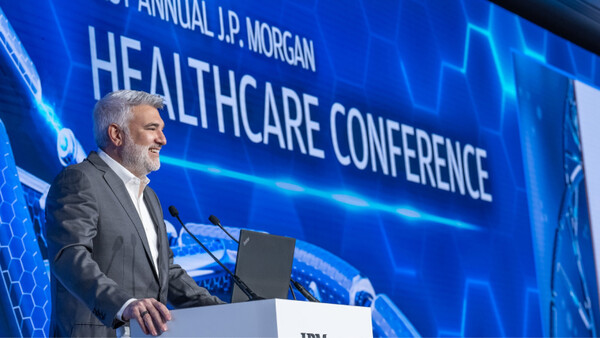SAN FRANCISCO, Calif. -- By Lee Han-soo/Korea Biomedical Review correspondent – The J.P. Morgan Healthcare Conference kicked off its 42nd annual conference at the Westin St. Francis San Francisco on Monday, with investors attending the event showing a lot of excitement about the prospect of a revitalized healthcare investment market this year.

Notably, J.P. Morgan's Global Head of Health Care Investment Banking Mike Gaito set a tone of cautious optimism and a clear vision for the future during his opening remarks, signaling exciting times ahead for the healthcare industry.
“The focus for 2024 seems to be on innovative solutions in areas such as obesity and artificial intelligence,” Gaito said. “With lower interest rates and market stabilization, private equity is expected to make a strong comeback, particularly in healthcare services.”
Reflecting on the conference's evolution since its inception, Gaito highlighted remarkable growth milestones.
This year, the conference boasts a record number of 614 presenting companies and a staggering total market capitalization of $8.2 trillion represented by these entities, according to Gaito.
Additionally, the conference reached a new peak in investor meeting demand, surpassing the figures in 2000, which held the previous record.
Gaito also touched upon the broader healthcare industry's performance, noting its ranking as the ninth sector in performance for the year, a slight dip since 2019.
“Despite challenging market conditions, the sector witnessed significant M&A activity,” he said. “The med-tech sector, having outperformed other verticals in 2023, is well-positioned for continued M&A activity and financing growth.”
Gaito’s comments were well supported as major multinational pharmaceutical companies announced a flurry of M&A deals as the conference kicked off on Monday.
Johnson & Johnson (J&J) acquired ADC developer Ambrx Biopharma for $2 billion, Merck acquired bispecific antibody developer Harpoon Therapeutics for $680 million, Novartis acquired immunotherapy company Calypso Biotech for $425 million, and Boston Scientific acquired neurostimulation therapies for urinary and fecal incontinence Axonics for $3.7 billion.
Gaito stressed that he anticipates transformational deals in this space to continue throughout the year.
In terms of challenges, Gaito acknowledged the ongoing economic and geopolitical headwinds, as well as the impact of the U.S. presidential election cycle on the healthcare sector.
“Volatility is expected, but the sector remains a central topic for both U.S. political parties,” he said.
Meanwhile, Korean companies’ drugs that had been licensed out to multinational pharmaceutical companies also received recognition as promising candidates during the conference.
For example, BMS mentioned Orum Therapeutics, Novartis mentioned Chong Kun Dang, and Johnson & Johnson mentioned LegoChem Biosciences in their presentations.
Orum had inked a deal to transfer all rights on ORM-6151, an acute myeloid leukemia (AML) or high-risk myelodysplastic syndrome treatment candidate, to Bristol Myers Squibb (BMS) for $180 million, and Chong Kun Dang inked a licensing deal valued at $1.35 billion with Novartis for its new drug candidate CKD-510, a small molecule histone deacetylase 6 (HDAC6) inhibitor in November of last year.
Most recently, LegoChem Biosciences concluded a deal to hand over the rights of LCB84, an ADC candidate, to Janssen Pharmaceuticals in December.
An industry official expressed his expectations of the possibility of additional deals in 2024.
“Korean companies’ presence at the conference is growing as they are coming to the conference with more and more promising candidates,” a multinational pharmaceutical business development official told Korea Biomedical Review, asking to remain anonymous due to company policy. “Also, the companies seem to have a higher level of expertise in introducing their candidates.”
The official added that his company also has plans to meet with a few Korean companies during the conference to hear about their pipelines, with the number showing an increase from last year.
“While a licensing deal takes time, this shows that Korea’s R&D capabilities are now receiving global recognition,” he said.
Related articles
- Korean pharma giants to impress investors at 2024 J.P. Morgan Healthcare Conference
- [JPM 2024] Flagship Pioneering's Berenson discusses biopharma collabo with Samsung
- [JPM 2024] Lotte Biologics unveils bio-plant plans at J.P. Morgan Healthcare Conference
- [JPM 2024] Samsung Biologics showcases robust performance in 2023, rosy picture for 2024
- [JPM 2024] Kakao Healthcare aims to go global with diabetes management, clinical data analysis
- [JPM 2024] Yuhan lays out global ambition at JPM 2024
- [JPM 2024] GC Cell CEO reveals ambitious plans for global expansion and innovation in CGT
- JPM 2024 reflections: a decade's journey in the global healthcare arena from a Korean perspective
- [JPM 2024] JP Morgan Asia investment head's advice on navigating the future of healthcare investment
- EY exec predicts continued surge in healthcare dealmaking in 2024

